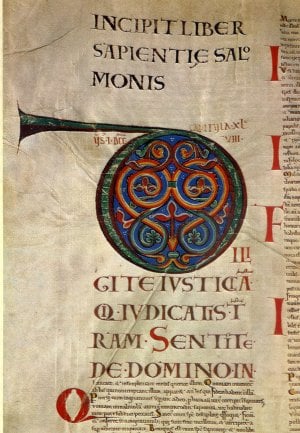 John Donne (1572-1631) was an English poet, satirist, lawyer and priest. He was born to a devout Roman Catholic family at a time when Catholicism was illegal in England: His brother Henry died of a fever while imprisoned for having given sanctuary to a Catholic priest. Many other relatives—including Sr. Thomas More—were executed for their faith.
John Donne (1572-1631) was an English poet, satirist, lawyer and priest. He was born to a devout Roman Catholic family at a time when Catholicism was illegal in England: His brother Henry died of a fever while imprisoned for having given sanctuary to a Catholic priest. Many other relatives—including Sr. Thomas More—were executed for their faith.
Donne officially renounced his Catholic faith in mid-life, perhaps because of his political ambitions. He published two anti-Catholic polemics: Pseudo-Martyr in 1610, and Ignatius his Conclave in 1611. In Pseudo-Martyr, he held that English Catholics could pledge an oath of allegiance to King James I without compromising their religious loyalty to the Pope—and with that, Donne won the favor of the king. In Ignatius his Conclave, he imagined many religious figures in Hell.
Donne had not wanted to take Anglican orders but finally, after being ordered by King James, he was ordained an Anglican priest in 1615. Six years later, in 1621, he was appointed the Dean of St. Paul’s Cathedral in London.
He wrote many religious poems and essays including his Holy Sonnets, Hymn to Christ at the Author’s Last Going Into Germany, and Devotions Upon Emergent Conditions, which includes the immortal lines “No man is an island” and “never send to know for whom the bell tolls; It tolls for thee.”
Today, for Trinity Sunday, here is his poem on the Trinity.
Batter my heart, three-person’d God
By John DonneBatter my heart, three-person’d God, for you
As yet but knock, breathe, shine, and seek to mend;
That I may rise and stand, o’erthrow me, and bend
Your force to break, blow, burn, and make me new.
I, like an usurp’d town to another due,
Labor to admit you, but oh, to no end;
Reason, your viceroy in me, me should defend,
But is captiv’d, and proves weak or untrue.
Yet dearly I love you, and would be lov’d fain,
But am betroth’d unto your enemy;
Divorce me, untie or break that knot again,
Take me to you, imprison me, for I,
Except you enthrall me, never shall be free,
Nor ever chaste, except you ravish me.











